Cyber Academe
Vision
“In today’s world where knowledge is the greatest asset, the benefits of the information-rich, technology-enhanced, Connected Learning environment must be extended to empower students, teachers, parents, schools and entire communities to learn without limits”
As we stand on the cross roads between the Industrial Age and the Knowledge Age, we can reflect on the quote from Vaclav Havel “Many things indicate that we are going through a transitional period where it seems something is on the way out and something else is painfully being born”.
Definitely education is going through the transitional phase, the brick and mortar setup has to transform into a digital setup. The transformation has already started: this will continue for a decade until a mature model get developed.
Cyber Academe is a model school for the Knowledge Age, where, the process of learning is not confined to the time spent in a classroom, with homework or on field trips. Learning involves many facets of activity and information flow that form a learning ecosystem. Today’s learning faces many barriers, including social, economic and technology constraints. Yet technology can effectively address these challenges.
In order for technology to improve education, schools must consider the total environment and fully understand the learning ecosystem. Barriers present in the ecosystem must be illuminated and appropriate technology-based solutions must be applied to overcome those barriers and thereby assist educational organizations in achieving their goals. Microsoft and Lycee technologies, as well as initiatives in global information technology standards, provide a broad range of capabilities for improving the learning ecosystem.
Schools today require flexible and cost-effective growth, including the use of existing technology and the ability to adapt to change. Therefore, the learning ecosystem must be agile, capable of changing and growing as new innovations occur in teaching, learning, technology, and as the needs of the ecosystem evolve and mature. Envision the possibilities of such an ecosystem, a community of learning for teachers, parents, students, and administrators in which:
- Each has access to personalized learning on a range of devices—anywhere, anytime—individualizing their learning capability and accelerating the learning cycle.
- Each is empowered to harness new technologies and learning applications, eliminating time-sapping struggles with the mechanics of learning.
- ‘Feminism’ and soft values, as opposed to personal gain and success at any cost.
- Learning is fully integrated with learners’ individual lifestyles and preferred learning styles—seamlessly adapting to their personal needs and abilities.
- A newfound comfort level with learning cultivates deeper perspectives and fresh viewpoints, igniting learners to explore the intricacies of learning itself and how it applies to their world.
- A limitless learning environment levels the playing field and knows no economic, ethnic, political, or social boundaries.
The Connected Learning Community is vision for lifelong learning. Connected learning today and in the future gives rise to a next-generation learning ecosystem powered by technology solutions that support highly accessible, engaging, and personalized learning in a connected world.
The Components of Cyber Academe
The learning ecosystem involves many parties: students, teachers, parents, administrators, government agencies and the community at large. Access requirements to facilities, curriculum, and general information are many and varied. Activities within the ecosystem also vary greatly between environments, from those within the confines of today’s brick and mortar schools, to virtual schools across the Internet and radio or satellite links for very remote communities. The learning ecosystem deals with a vast set of challenges in the process of assisting with outcome-based learning and attaining the highest level of educational achievement.
The Connected Learning Community approach addresses the many facets and challenges of today’s learning ecosystem and recognizes the potential to achieve greater degrees of connectedness among all parties to foster higher learning outcomes. Through standards and technology, the Connected Learning Community enables a more effective learning ecosystem. In this ecosystem:
- Students work and collaborate both inside and outside the classroom. Learning is personalized and self-directed. Students have flexible, anytime access to infinite resources. Students learn and achieve in new ways
- Parents are kept informed of their child’s progress at all levels. They can access assessments and teacher feedback and communicate with teachers and administrators. School performance improves, as does the child’s education
- Teachers access rich content resources and tailor instruction to the needs of individual students. They track student progress and rapidly take appropriate action when necessary. Teachers communicate easily with parents, administrators, and each other. Flexible, self-directed professional development enables teachers to continuously improve their skills
- Administrators work in an integrated environment where student information is seamlessly integrated between systems within the school, across schools, and with government agencies. Work processes are streamlined and automated. Administrators easily communicate with stakeholders, manage costs, and improve school performance

Digital Infrastructure
While building the digital infrastructure Gen Extra Muros Pedagogy is taken into consideration. In one teaching session there will be 5 educators viz., Presenter, Collaborators, Engagement Specialist, Content Managers and DTHL Coordinator.
The Presenter will deliver the lecture to a maximum of 300 participants in one session. Presenter will use interactive smart panel display with touch and handwriting recognition facility to present the lesson plan to the student. Presenter will have a Display in the front for interacting with the students.
During the lecture, the Collaborator will answer the questions from the learner on the chat. The Engagement Specialist will send quizzes to the learners at different intervals to understand if the lecture is being understood or not. Depending on the feedback from the quizzes, the Content Manger might display videos or graphics to enhance the learner interest and understanding in the subject, or will plan an Experiential Learning session by taking the students on a virtual trip to meet experts.
Cyber Academe uses Microsoft Teams as a collaboration platform. This platform helps in making the school a digital school. This is a secure platform crafted specially for Education Segment, with features such as Attendance, Assignments etc., Teams has a robust policy management platform which help to maintain user privileges.
The Student and staff credentials are created on O365 Platform. O365 apps such as PowerPoint, Flip Grid, Sway, One Note, Class Note, forms, white board etc., are used to teach different lesson plans for different grades.
Lycee –Education Management System is used to manage the data. Communication and collaboration platform of Lycee is used for collaboration between the education stakeholders viz., Management, Staff, Parents and Students. Lycee Learning Management System helps in personalized learning using Artificial Intelligence and Machine Learning. Students can also benefit from built-in STEM & STEAM learning. IOT and BOTS assist the students to solve problem and answer questions.
Lycee e-Governance platform helps administrator to manage the school remotely. The e-Commerce system helps with fee collection, sale of uniforms, books etc., Cyber Academe is Knowledge Age complaint and the curriculum is based on 5C SKILLS, MULTIPLE INTELLIGENCES PLATFORM, MULTI-MODE ASSESSMENTS, DIGITAL INTERVENTIONS, MULTILINGUAL INTERFACES and Experiential Learning.
360 Degree Education
Cyber Academe goes beyond syllabus based learning as it give importance to 360 degree development of the learner by including the following activities in the curriculum:
Sports, Games, Film, Theatre, TV, Art, Craft, Creativity, Music, Dance, Health & Wellness, Technology, Safety and Disaster Management, Ecology, Tourism, History and Heritage, Adventure & Adventure sports, Employment, Entrepreneurship, Social & Emotional Skills, World Culture, Human Values, responsible Citizenship, Caring for elders differently-abled & Animals.
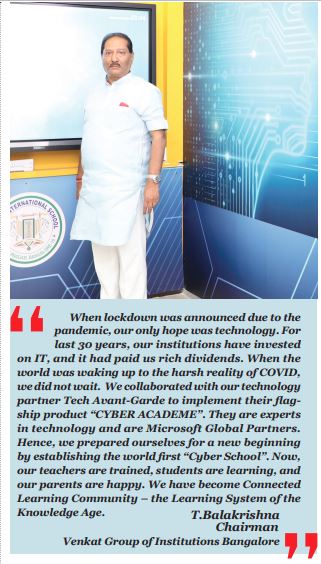
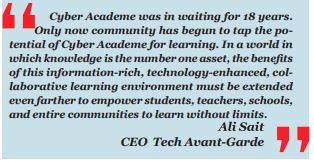
Cyber Academe Philosophy
An effective and comprehensive learning ecosystem delivers tools for learning, focusing on the role of technology as an enabler rather than on the technology itself. As teaching is refocused to learning, this ecosystem must be in place to facilitate individuality in place of traditional educational processes. This learning ecosystem is flexible, adapting to new innovations in teaching, learning, and technology.
Cyber Academe supports anytime, anywhere learning and helps to overcome social, economic and technology challenges and improve the learning ecosystem.
This learning ecosystem is the Connected Learning Community, a community of learning for teachers, parents, students, and administrators.
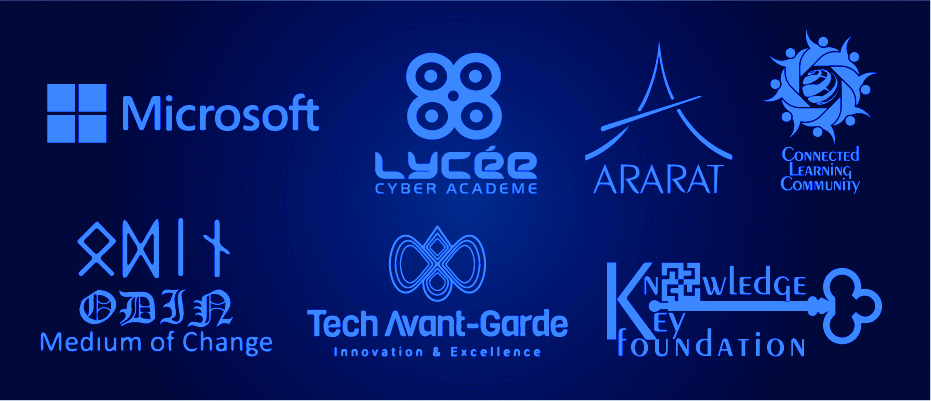
Enabling Digital Fee Payment
The Government of India in its efforts to promote digital payment modes throughout the country has introduced Bharat Bill Payment System (BBPS), a mechanism for enabling contactless digital payments.
The Bharat Bill Payment System (BBPS) is a Reserve Bank of India (RBI) conceptualized system driven by the National Payments Corporation of India (NPCI) which offers integrated, accessible and interoperable recurring payments services to consumers. One single step of on boarding on BBPS makes any school discoverable and accessible on all BBPS enable channels, including BHIM, UMANG, Banks website, all major UPI enabled Apps and Wallets. This enables parents to pay education fees easily from their preferred banks/Mobile Apps/Wallets.
NCERT, CBSE, ICSE, and all state education boards in India have been requested to promote digital fee payments by the Government of India.
CBSE vide Circular no. 18/2020 dated 28.09.2020 has issued directions to the affiliated schools regarding collection of fees from students only online or through non-cash mode.
Hence all schools affiliated with the Board are advised to on-Board on BBPS for to enable, safe, easy and contactless digital payment of school fees.
BBPS is now connected to Efeeonline platform to on-board school fees easily on the BBPS digital payment platform. Schools can connect to this platform using their ERP or data could be provided on the excel sheet. During onboarding for digital fee payments, MID (School Merchant ID) and SSL Certificate (to enable secure transaction) will be provided by the Efeeonline platform. School website is not required for fee collection, as fee collection interphase will be provided by 70 banking channels and 10 digital channels.
Efeeonline is a bespoke multi-model fee management system, which helps educational Institutions to transform their legacy manual fee collection system to a Digital System. Where the fees could be paid from anywhere, any place and on any device.

Efeeonline has the following facilities:
• The Fee Management Platform: Using this facility the fees formats, receipts, dues and reports could be generated.
• Parents Dashboard and Mobile App: Parents can pay the fees, get fee receipts and can track fee dues using this facility. Which is available online and as a mobile app on IOS and android.
• E-Governance: Using this facility the school administration can do real-time tracking of the online fee collection and settlements.
The schools can use Efeeonline to generate their fees and upload on the Efeeonline fee collection platform, which in turn is connected to BBPS platform. BBPS facilitates a plethora of payment modes through which consumer can make a fee payment. The payment modes options at BBPS are Cash, Cards (Credit, Debit & Prepaid), IMPS, UPI, Aadhaar Enabled Payment System (AEPS), Internet Banking & UPI, and Wallets.
Efeeonline is a readymade platform, this solution enables automation of routine administrative tasks such as student’s data, fee formats, fee demands and fee receipts etc., thus allowing for better management and reporting of fees. Other benefits include increased interactivity and collaboration with the parent, simplified communication, and improved accountability.
MASP PRO: Efeeonline is also available on Microsoft Aspire School Program offering as MASP PRO. This is a value-based offering, which has dual advantage it enables digital teaching-learning process and it also enables digital fee collections.
The presently prevalent systems of schooling practices have been generated to address the needs of the Industrial Age. New times call for new organizations that can handle uncertainties of the knowledge age of the future, rather than the industrial age of the past.
As we prepare to charter the unfamiliar terrain that lies ahead, we need a new kind of enabling device, one with very different competencies and a whole new sense of direction. While this may be cause for anxiety to industrial societies, a period of transition, where the old order gives way to new is being put in place. Yet, there is also a sense of tremendous adventure and opportunity for all.
This requires reengineering, benchmarking, continuous improvement, total quality management, lean productivity and high accountability – one has to stay ahead of the change curve, constantly redefining institutions, creating new opportunities, blazing new trails, reinventing the competitive rules and challenging the status quo.
Digital Transformation in education is inevitable to handle the learning requirements of the Knowledge Age. Technology that is available today and continuously bolstered by developments on the horizon can provide enterprising educators and communities with a platform for improvement unlike any in history.
To transform a “Traditional School” to a “Digital School” the following process should be followed:
TRANSFORMING OPERATIONS, TRANSFORMING LEARNING, ENABLING HOLISTIC EDUCATION, ENABLING AN ECOSYSTEM and Implementing a CONNECTED DELIVERY PLATFORM.
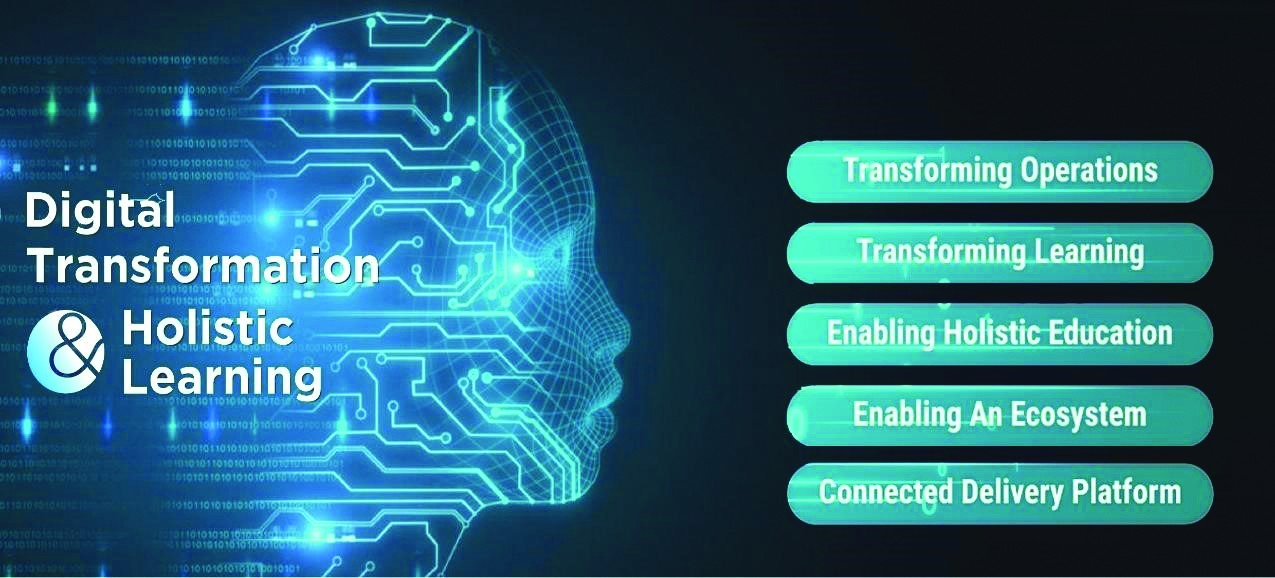
Transforming Operations
This must be the first step in Digital Transformation; manual operation will not help. A high quality School Management System such as Lycee should be implemented to manage the DIGITAL OPERATIONS, DIGITAL QUALITY CONTROL & DELIVERY and GOVERNANCE.
Once the process such as school data, Fee Management, Result processing, Payroll, Accounts etc., is automated, the system will become more efficient and robust. All the stakeholders will be benefited.
Transforming Learning
This is the most important step is to transformation learning. This phase consists of the following steps EDUCATOR CAPABILITY, RELEVENCE, CONTENT CURATION & OMNI CHANNEL STREAMING, EXPERIENTIAL LEARNING USING MIXED REALITY, EXPERT MENTORING & COMMUNITY INVOLVEMENT
Under the DTHL program, first the members of the school management are trained on Digital Transformation. Then a collaboration platform such as Microsoft Teams and Microsoft O365 is introduced. Two to three staff members from the school with IT knowledge are chosen as DTHL coordinators. The responsibility of the DTHL coordinators would be to master the platform and transition the physical school to digital school. Implementation will start by creating the credentials for the stakeholder. Teachers are mapped to the virtual classes and their lesson plans are assigned. Students are mapped to the virtual classes, and digital policy is implemented.
Educators are trained and certified on the Collaboration Platform, various Teaching Apps, how to generate Digital Content and on different aspects of teaching such as STEM, STEAM, Mixed Reality, Augmented Reality, Virtual Reality, Artificial Intelligence, Machine Learning and usage of BOTS.
Under the DTHL program the teachers are trained and certified as MIE (Microsoft Innovative Educator) MIEE (Microsoft Innovative Educator Expert) and MIE Trainers. The teachers who have better digital teaching skills are given an opportunity to make presentation in the Knowledge L’avenir Conclaves which is the largest social learning platform for teachers.
Teachers are trained on Lycee – Institution Management System on how to enter student performance data and to generate report. They are also trained on the communication platform of Lycee to collaborate with the parents and colleagues.
Parents are oriented on the dos and don’ts of the digital platform before the online classes commence.
Gen Extra Muros – Digital Pedagogy is implemented to guide the teachers how to teach on the digital platform.
Enabling Holistic Education
The Digital Learning should not be only restricted to syllabus based learning; it should be extended to extracurricular activities such as, Sports, Games, Film , Theatre, Art, Craft, Creativity, Music, Dance, Health & Wellness, Technology, Safety and Disaster Management, Ecology, Tourism, History and Heritage, Adventure & Adventure sports, Employment, Entrepreneurship, Social & Emotional Skills, World Culture, Human Values, responsible Citizenship, Caring for elders differently-abled & Animals.
Events such as Independence Day, Republic Day, Mother’s Day, Children’s Day, Teacher’s Day etc., could be celebrated on the virtual platform. Subject experts and important personalities could be invited to address the students virtually.
Enabling an Ecosystem
Educational Institutions must become center point for community progress. Once the communication and collaboration platform is implemented the stakeholders of education can collaborate with each other, member of the community, and thought leaders to gain knowledge on demand.
Connected Delivery Platform
Digital platform cannot has disjointed every activity of the Digital School should be connected to a single platform.
Lycee – Cyber Schooling platform has six integrated platforms they are as follows:
Lycee – ERP manages the stakeholder’s information and automates processes such as Fee Management, Result Management, Library, Payroll accounting to name a few.
Lycee – Collaboration and Communication Platform enables the interaction between the stakeholders of education.
Lycee – Learning Management Platform – is enabled with Artificial Intelligence, Machine Learning, Cognitive Learning, Multiple Intelligences concepts, Multimode Assessment, and Immersive learning, where the learning can be relevant, personalized and individualized.
Lycee – Content Management Platform – is enabled with STEM and STEAM learning, Virtual Reality, Augmented Reality, Mixed Reality and BOTS.
Lycee- E-Commerce Platform – enables school stores, canteen, fees and Library to go online for digital commerce.
Lycee E-Governance – Using this facility school management and administrators can manage the institution from anywhere any place on any device.
Once the Digital Transformation & Holistic Learning program is implemented the school transforms from a Traditional School to Digital School.
Once the School has implemented DTHL program and is Future Ready. The school is graduated to a Digital School in a Carte Blanche Graduation ceremony
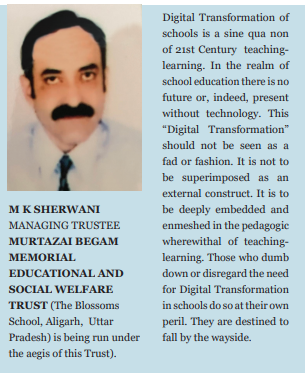
Also read: Carte Blanche Graduation: New benchmark for Schools
















Add comment